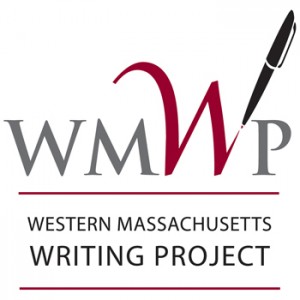 We spent a good part of a Leadership Meeting for the Western Massachusetts Writing Project yesterday, looking at and talking about the new Massachusetts Language Arts curriculum that is framed around the Common Core. Here are some notes from that discussion:
We spent a good part of a Leadership Meeting for the Western Massachusetts Writing Project yesterday, looking at and talking about the new Massachusetts Language Arts curriculum that is framed around the Common Core. Here are some notes from that discussion:
- Most of our school districts have not yet begun to do much of anything related to the upcoming shift to the new state frameworks (mine seems to be ahead at this point, as we are using almost all of our professional development time with curriculum mapping as it relates to the shift)
- There are “openings” for more collaboration between ELA teachers and content-area teachers, but we worry that our colleagues in the disciplines are not prepared for the ways literacy is framed to be taught “across the curriculum.” The content-area literacy ideas are bundled under the ELA frameworks, and those documents are not necessarily being given to non-ELA teachers (if there is such a thing, right?)
- There’s an important theme of the introduction of the Massachusetts ELA document that stresses that the frameworks are not designed to dictate how things are taught, but rather, what students should be expected to have learned by the time they graduate high school. We appreciated that kind of language, as if feels more like adults talking as opposed to autocratic finger-pointing. Sort of.
- ELA teachers are going to have to learn to teach new genres (scientific abstracts, “reading” data, understanding facets of historical documents, etc.) and shift the balance of fiction reading and fiction writing towards more informational text and expository/persuasive writing.
- We all wonder what the assessment will look like and how that will drive the way the new curriculum is used by school districts. While the new curriculum seems on the surface to have flexibility, the nature of the assessment (our state is part of the PARCC group) will play a huge role for many schools. There was a genuine worry that financial considerations and logistical considerations will shape the assessment, rather than educational and learning practice.
- While the Massachusetts curriculum acknowledges cultural and language diversity in its Guiding Principles, it seems like those principles get the back seat in the actual standards. This concerns our group, since one of our focus areas has been ways to support and nurture student voices. We talked about ways that a teacher could navigate through this minefield of language and expectations.
- It was pointed out that while we often talk of the importance of an educated populace built around the three concepts of a strong democracy, pursuit of personal goals, and employment, the focus of the Common Core around college and career-ready goals says a lot about who was working on the original document.
- While the Common Core may not be billed as a national curriculum, it sure is looking like it to us, and we noted that textbook companies are ramping up production of textbooks that tap into shared curriculum ideas among states, and we all know how often textbooks drive curriculum. That worries us, particularly if “canned curriculum” starts coming down the pike of Common Core.
It was a great discussion and we used an article from NCTE called “Keeping Students at the Center of the Common Core Classroom” by Lorna Collier (it was published in The Council Chronicle in September) as a piece of shared reading that shows ways that teachers can use and adapt the Common Core while still focusing on students as individuals. It’s a good piece to read, if you haven’t done so yet.
Peace (in the core),
Kevin
Pingback: Things I am Reading Online 10/19/2011